Rating: 5 out of 5





One of, if not the greatest, President in U.S. history is President Abraham Lincoln. Lincoln was the 16th President of the United States. As President, he led the nation through the American Civil War, preserving the Union and abolishing slavery. If you remember from your history classes, Lincoln was born into poverty in the legendary log cabin in Kentucky. He was raised on the frontier, primarily in Indiana. Lincoln was self-educated, only having formal education for a year, and became a lawyer, Whig Party leader, Illinois state legislator, and U.S. Congressman from Illinois. He had a legendary Senate race against Stephen Douglas. When he ran and became President in 1860, the southern states decided to bounce or seceded from the Union. Wanting to see all men free and equal, he engineered the end to slavery with his iconic Emancipation Proclamation. He also promoted the Thirteenth Amendment to the United States Constitution, which outlawed slavery across the country. Lincoln threw down a great speech with the Gettysburg Address. Sadly, he was assassinated. Yet, his story and legacy live on with the striking Lincoln Memorial in Washington DC being on the five-dollar bill and that penny.
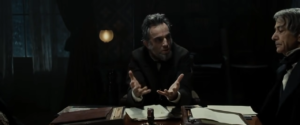
Directed and produced by the all-time greatest director Steven Spielberg, Lincoln covers the final four months of the legendary President’s life. The main focus was on his efforts to abolish slavery and involuntary servitude by having the Thirteenth Amendment to the United States Constitution passed by the United States House of Representatives. Lincoln starts in January 1865 as President Abraham Lincoln (Day-Lewis) expects the Civil War to end soon, with the defeat of the Confederate States. President Lincoln’s top concern is the passing of the Thirteenth Amendment. He believes his 1863 Emancipation Proclamation may be thrown out by the courts as it is looked upon as a wartime law. He feels that the nation must have this law amendment to heal itself, yet he knows that it probably won’t pass without some significant help. Many sides have many questions about the amendment. The Radical Republicans fear the amendment will be defeated by some who wish to delay its passage. The amendment also requires the support of several Democratic congressmen to pass. Yet, President Lincoln sees a significant opportunity to get the amendment passed. With dozens of Democrats becoming lame ducks after losing their re-election campaigns. Many of President Lincoln’s advisors believe he should wait for the new Republican-heavy Congress. President Lincoln believes otherwise and sends out his cabinet to get the amendment passed and in place, before the war ends and the readmittance of the southern states. Only time will tell if his crew can pull it off.
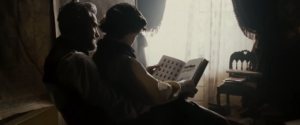
Spielberg knows how to make a story and tell it. First, I think the opening scene was masterfully done and set the tone for the movie. The film opens with a brutal and muddy melee battle. The scene shows people being stabbed, punched, and everything that goes on in a close-quarter battle. As the scene expands, many of the soldiers in blue uniforms are black men while they fight against the Rebel Army. Then the camera cuts to show a black soldier in an army camp talking to someone who is revealed to be President Lincoln. Two black soldiers, Private Green and Corporal Clark tell Lincoln their names, ranks, and where they’re headed to Wilmington. They are pleased to be paid the same rate as their white counterparts. Still, Clark complains about the lack of commissioned negro officers. He sarcastically predicts that whites might be able to tolerate a negro colonel in 50 years — and “in 100 years, the vote.” As he is about to continue, a few white soldiers who heard Lincoln’s Gettysburg address start reciting lines from it. As they are called away, Corporal Clark smiles and finishes the speech as he walks away.
Then from that scene, Spielberg goes into the true politics and maneuvering that President Lincoln and his team had to take to get the amendment passed. I liked that it showed President Lincoln and his struggle to have his cabinet believe in him. He was soft-spoken, yet he wanted the amendment to pass because he knew it would be the first step in healing the nation. The film also showed his relationship with his family and how he and his wife interacted along with his sons. Sally Lincoln let some people have it at a party. It was a funny scene to see her chew people out in such an elegant way. Yet, I think you saw the years on President Lincoln’s face in the end. Lieutenant General Ulysses S. Grant said it best when he said just a year had passed since he saw the President, and he looked 10 years older.
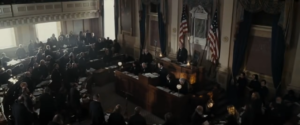
Spielberg also showed what President Lincoln’s team went through to try and figure out how to pass the bill. With a team of three individuals who seemed opposite of each other. I found them to be the BEST and most ENTERTAINING parts of the movie. When they approached a Democrat, it was either they had beer thrown on them or, in William N. Bilbo’s case, almost got shot a few times. Yet, this team set up reconnaissance and worked hard to get the votes needed to pass the amendment. One area I did love was when the southern delegates, along with the Confederate States Vice President Alexander H. Stephens, decided to meet with Lieutenant General Ulysses S. Grant. When the southern delegates come to be escorted to their destination or next stop, they are greeted and accompanied by a regiment of black soldiers. Some representatives look on in shock while Stephens simply nods his head and says much obliged.
Also, I liked how Spielberg added int the House parts. You could see that the two sides HATED each other and just talked down on each other. The spats between the two sides as it came to this amendment were eye-opening and speak on today. I will say that Republican Congressman Thaddeus Stevens of Pennsylvania was a BOSS. The man had all the best scenes. One of my favorites was when he spoke to Democratic Congressman Alexander Coffroth of Pennsylvania. Man messed up his name so many times that all the man could do was stutter. Another scene with Stevens was when he gave his speech to defend the bill and not piss off anyone. I will say that the best and most intense scene came with the actual voting. You wondered if people would change their vote, and I loved seeing the stress on some people’s faces. I liked how the vote ended with the Speaker of the House saying that he wanted to cast a vote because it would be history in the making.
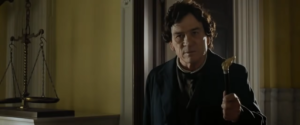
I have no words for the cast because EVERYONE was phenomenal, fantastic, and exceptional in this film. Honestly, this movie wouldn’t have been as good without so many great performances. First, let’s talk about the one and only Daniel Day-Lewis and President Lincoln. Day-Lewis is simply the man when it comes to acting. You can tell that he gets into his role so much and does a fantastic job preparing and researching. As Lincoln, you could’ve sworn he was reincarnated as the President. He was soft-spoken and what I love about President Lincoln was he had this grandpa-type vibe about him who always had a story to tell. I thought it added an element of gentleness to the legendary man.
I also want to give a shout-out to Sally Field as First Lady Mary Todd Lincoln. She was excellent, and I enjoyed her when she was on the scene. She just had this feistiness about her that even made the President scared. The dinner party was her best scene. One second, she is on the floor arguing and crying with President Lincoln, and the next, she is at this party with smiles. I want to say that Tommy Lee Jones as Republican Congressman Thaddeus Stevens of Pennsylvania was fantastic, and I loved every minute he was on the scene. He was like that grouchy old man who believed so much in what he was doing that he really fought for what he believed in. I found Jones excellent and loved how he spoke to Coffroth. I want to give a last shout-out to James Spader as Republican Party operative William N. Bilbo. He was funny, had that country accent, and seemed to be the life of the party and movie. He knew his job and executed it the best that he could.
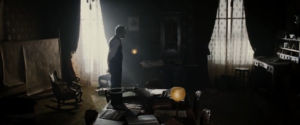
Finally, can we give it up to the one and only Steven Spielberg? If you have read any of my past reviews, you know how I think Spielberg is the best director ever and this film just added to his legacy. My homeboy knows how to tell and present a story, whether fantasy or historical. I applaud you, Mr. Spielberg.
Lincoln is a film that everyone should watch and learn from. President Lincoln was a legendary man who tried his best to heal the country and make sure it got back on track after the war. His commitment to freedom and his team should always be remembered. Daniel Day-Lewis turned in another stellar performance along with Jones, Fields, and others. Spielberg once again made an excellent film. Watch this film and then go to D.C. and stand in front of this great President and leader.